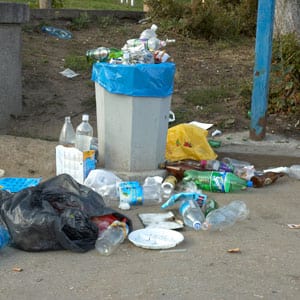Public space
Urban Waste Pollution
![]() CONTEXT
CONTEXT

Regulations on waste management have been reducing the impact of waste on health and on the environment since the end of the last century. New treatment systems and technologies have managed to reduce waste emission levels to 3%. However, the significant increase in the volume of waste observed in recent years, due to the concentration of social and economic activities in urbanised areas and the demographic growth of small cities, may result in uncontrolled dumping and major consequences.
Hotter temperatures favour the proliferation of infestations of mosquitoes and other insects that can transmit viruses and infectious diseases in environments containing decomposing organic waste.
All the elements of the collection system should be studied with a view to minimising the noise impact of the collection processes and not setting aside a significant part of the public space to this use to the detriment of the rest. It should also be stated that the virtually silent collection systems in place in some areas need to be implemented in all areas.
![]() OBJECTIVE
OBJECTIVE
- Act on environmental contamination that causes an accumulation of urban waste in cities and reduce the noise pollution of its collection systems.
- Prevent the uncontrolled dumping of waste.
- Increase the selective collection of commercial waste.
- Reduce the volume and diversity of urban waste.
![]() PROPOSALS AND RECOMMENDATIONS
PROPOSALS AND RECOMMENDATIONS
- Implement selective collection systems to improve processing and make progress towards the sustainable management of municipal waste. These systems should be accessible for everyone and easy to use.
- Choose the collection system (surface bins, door-to-door collection) in accordance with the needs of each location. A preliminary study should be carried out to this end.
- Municipalities that have implemented selective collection have generated various combinations of mixed models:
- Door-to-door for organic waste and non-recyclable waste and bins for glass, packaging, and paper and cardboard.
- Pneumatic collection for organic, packaging and non-recyclable waste and door-to-door collection for cardboard and glass.
- Door-to-door for urban development areas and bins in the centre of the municipality or vice versa.
- Underground bins for all types of domestic waste and door-to-door for commercial waste.
- Implement awareness campaigns for the suitable disposal of materials.
- Implement campaigns to promote the use of composting and worm composting for domestic waste reduction and recycling.
![]() REFERENCE EXPERIENCES
REFERENCE EXPERIENCES
Information only available in Catalan
- Ajuntament de Vilassar de Mar, 2009. Ordenança municipal de Vilassar de Mar que regula la recollida dels residus.
- Consorci per a la Gestió dels Residus del Vallès Oriental. Laboratori municipal dels residus. Integració paisatgística dels contenidors de recollida a la via pública.
- Diputació de Barcelona .Cercles de comparació de gestió de residus i neteja viària.
![]() LEGISLATION
LEGISLATION
- Ley 22/2011, de 28 de julio, de residuos y suelos contaminados.
- Decret legislatiu 1/2009, de 21 de juliol, pel qual s'aprova el Text refós de la Llei Reguladora dels residus.
- Llei 8/2008, de 10 de juliol, de finançament de les infraestructures de gestió dels residus i dels cànons sobre la disposició del rebuig dels residus.
- Decret 21/2006, de 14 de febrer, que regula l'adopció de criteris ambientals i d'ecoeficiència en els edificis. Article 7 Paràmetres relatius als residus
- Directiva Europea 2008/98/CE, sobre residus i per la que es deroguen determinades Directives.
![]() STUDIES AND TECHNICAL DOCUMENTATION
STUDIES AND TECHNICAL DOCUMENTATION
- Diputació de Barcelona. 2006. La recollida selectiva de residus a la regió metropolitana de Barcelona.
- Diputació de Barcelona, 2006. Nota tècnica sobre l'impacte acústic dels processos de recollida dels residus municipals.
- Diputació de Barcelona, 2007. Nota tècnica sobre l'emissió de gasos d'efecte hivernacle en la gestió dels residus municipals.
- Diputació de Barcelona, 2016. Guia "on line" Entorn urbà i salut. Equipaments. Condicions saludables. Fitxa "Gestió dels residus".
Scientific papers:
- Laner, D., et al. 2012. A review of approaches for the long-term management of municipal waste landfills. Waste Management, 32(3), 498-512.
More information about addressing the Public Health Service: entornurbasalut@diba.cat
Date of last update:
dl., 28 d’oct. 2019 12:49:05 +0000
Your privacy is our priority
To protect your privacy, before continuing we want to make sure that you know that, both we and our collaborators, use some “cookies” on the website to facilitate its use:
- Own and third party for statistical purposes, with which no user information is collected nor access IP addresses are recorded.
- Our own and third parties to guarantee basic functioning, such as the user session, and personalization aspects, such as the language of our pages.
We save the acceptance of cookies for 30 days to improve the browsing experience. Remember that you can delete cookies from your browser at any time. - From third parties to show you information from our social networks, such as Facebook, X, YouTube, etc. By accessing these websites you can decide whether or not you accept their privacy and cookie policies.








 CONTEXT
CONTEXT  OBJECTIVE
OBJECTIVE  PROPOSALS AND RECOMMENDATIONS
PROPOSALS AND RECOMMENDATIONS  REFERENCE EXPERIENCES
REFERENCE EXPERIENCES  LEGISLATION
LEGISLATION  STUDIES AND TECHNICAL DOCUMENTATION
STUDIES AND TECHNICAL DOCUMENTATION 

